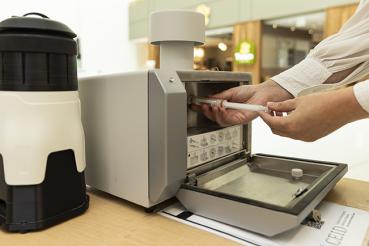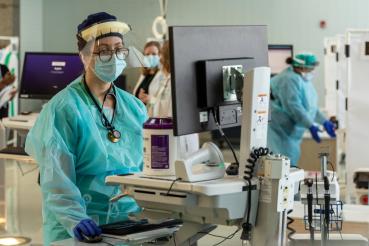Although it is still uncertain if and when COVID-19 boosters will become available this fall, some people are eligible for another dose of the vaccine now.
We asked Lisa Ravindra, MD, FACP, an internist and assistant professor of medicine at Rush University Medical Center, to answer some of the common questions she’s had from patients about getting another COVID-19 shot.
Who should get a third dose of the Pfizer and Moderna vaccines now? Why?
According to current guidelines, people who are immunocompromised may consider receiving a third dose of the Pfizer or Moderna COVID mRNA vaccine at least 28 days after completing the primary two-dose series. This includes people whose medical conditions or treatments for their medical conditions can moderately or severely compromise the immune system, such as:
Those undergoing active or recent treatment for solid tumor and blood cancers
- Patients who have received solid organ or recent stem cell transplants
- Those with moderate or severe primary immunodeficiency
- People with advanced or untreated HIV infection
- Patients who take high-dose corticosteroids, alkylating agents, antimetabolites, tumor-necrosis (TNF) blockers, and other biologics that suppress the immune system
- People with chronic kidney disease, asplenia (the absence of the spleen), or other chronic medical conditions that may be associated with a weaker immune system
If you fall into this group, you should consider having an additional dose of the vaccine because you have a higher risk for becoming severely ill from COVID-19. Immunocompromised people also have been found to have lower levels of antibodies to COVID variants after getting the initial two doses, compared with non-immunocompromised people. Data shows there are also more breakthrough cases in this population.
If you are immunocompromised, you can schedule an appointment for a third shot in our drive-through clinic through MyChart, with your Rush provider or visit a local retail pharmacy.
Is the third dose the same dose as the first two shots? And should I expect the same side effects that I had after the first two doses?
The third shot for immunocompromised patients is the same dose as the prior two doses.
In small studies of immunocompromised patients who received a third dose of vaccine, the side effects reported were consistent with previous doses, and the symptoms were mostly mild or moderate.
I am immunocompromised and I had the Johnson & Johnson vaccine. Do I need another dose?
Right now, we don’t have enough data on the Johnson & Johnson vaccine to know if an additional dose is recommended.
So immunocompromised people should get a 'third dose' of the Pfizer or Moderna vaccine. How is this different from healthy people who had the Pfizer or Moderna vaccine potentially getting a booster shot?
While we are expecting official guidelines for boosters for people with healthy immune systems soon, no formal recommendation has been released by the CDC’s Advisory Committee on Immunization Practices.
It’s likely that people with healthy immune systems will be able to start receiving a booster shot beginning in the fall, with individuals being eligible starting eight months after they received their second dose of the Pfizer or Moderna vaccine. We do not yet have information on the dose of a booster, if it is in fact recommended.
We don’t yet have information about side effects after an additional dose for patients with healthy immune systems, but I would expect side effects to be similar to the initial doses.
Why would a booster of the Pfizer or Moderna vaccines be needed for people who are not immunocompromised?
We are seeing that protection against COVID-19 infection (including asymptomatic or mild infections) appears lower in recent months. It’s not clear yet if this is due to the vaccine’s effectiveness decreasing over time or due to the delta variant or a combination of causes. However, COVID-19 vaccines continue to be very protective against severe disease, hospitalization, and death.
Does this mean the vaccines aren’t effective?
Not at all. The COVID-19 vaccines are very effective in preventing severe illness, hospitalization, and death, even against the delta variant. While the vaccines are working well, some people who are fully vaccinated against COVID-19 will still get sick, because no vaccine is 100 percent effective.
To maximize protection from the delta variant and possibly prevent spreading it to others, everyone should wear masks indoors in public, even if fully vaccinated. We are hoping that a booster will help improve protection against the delta variant.
Will additional doses/boosters continue to be necessary?
It’s not clear if we will continue to need additional doses. Other common vaccines, such as those for hepatitis B and human papilloma virus (HPV), require several doses.
Is it OK to get a COVID shot at the same time as a flu shot? If not, how much should they be spaced apart?
Yes, the COVID-19 vaccine and seasonal flu vaccines can be given at the same time. Flu shots are currently available, and I encourage all my patients to get this shot every fall.
If you have not yet received a COVID-19 vaccine or if you are immunocompromised, you can schedule an appointment to receive a vaccine now at one of our vaccine clinics.




